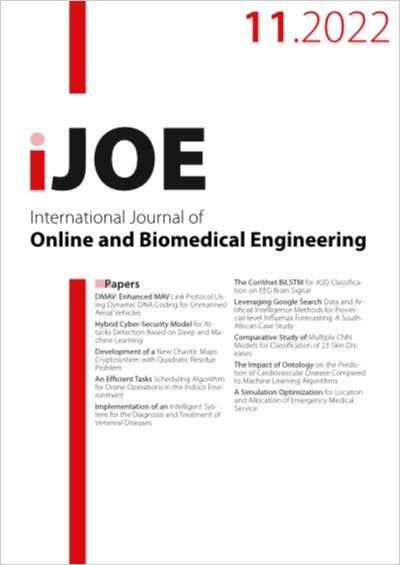Implementation of an Intelligent System for the Diagnosis and Treatment of Venereal Diseases
DOI:
https://doi.org/10.3991/ijoe.v18i11.32329Keywords:
Commonkads, diagnosis, venereal diseases, expert web system, treatmentAbstract
Over time, human beings are attacked by different venereal diseases, which cause serious consequences. Not all people know exactly if they suffer from a venereal disease, so they look for possible treatments based on their symptoms in different media, not all of them are reliable. The objective of the research is to implement an expert system, which through a web page, provides a correct diagnosis based on the symptoms registered by the user, as well as a possible treatment for the identified disease. This was achieved based on the knowledge tree that was developed in Python so that when a user completes the symptom record, the expert system continues with the process. All this procedure was carried out using the Common kads methodology. which is related based on knowledge topics. The result was the development of the application, which was validated by different specialists in expert systems, giving a total average of 4 as a response, which was qualified as a high-quality level, on the other hand, the system brings an improvement in the acquisition of information through the web, providing diagnoses and possible treatments, in addition, it provides a facility to people who do not wish to attend a health establishment, as well as to specialists in the health sector, which allows them to provide diagnoses and treatments.
Downloads
Published
How to Cite
Issue
Section
License
Copyright (c) 2022 Roberto Muñoz-Villacorta, Carlos Oscco-Aguero, Laberiano Andrade-Arenas

This work is licensed under a Creative Commons Attribution 4.0 International License.
The submitting author warrants that the submission is original and that she/he is the author of the submission together with the named co-authors; to the extend the submission incorporates text passages, figures, data or other material from the work of others, the submitting author has obtained any necessary permission.
Articles in this journal are published under the Creative Commons Attribution Licence (CC-BY What does this mean?). This is to get more legal certainty about what readers can do with published articles, and thus a wider dissemination and archiving, which in turn makes publishing with this journal more valuable for you, the authors.
By submitting an article the author grants to this journal the non-exclusive right to publish it. The author retains the copyright and the publishing rights for his article without any restrictions.


